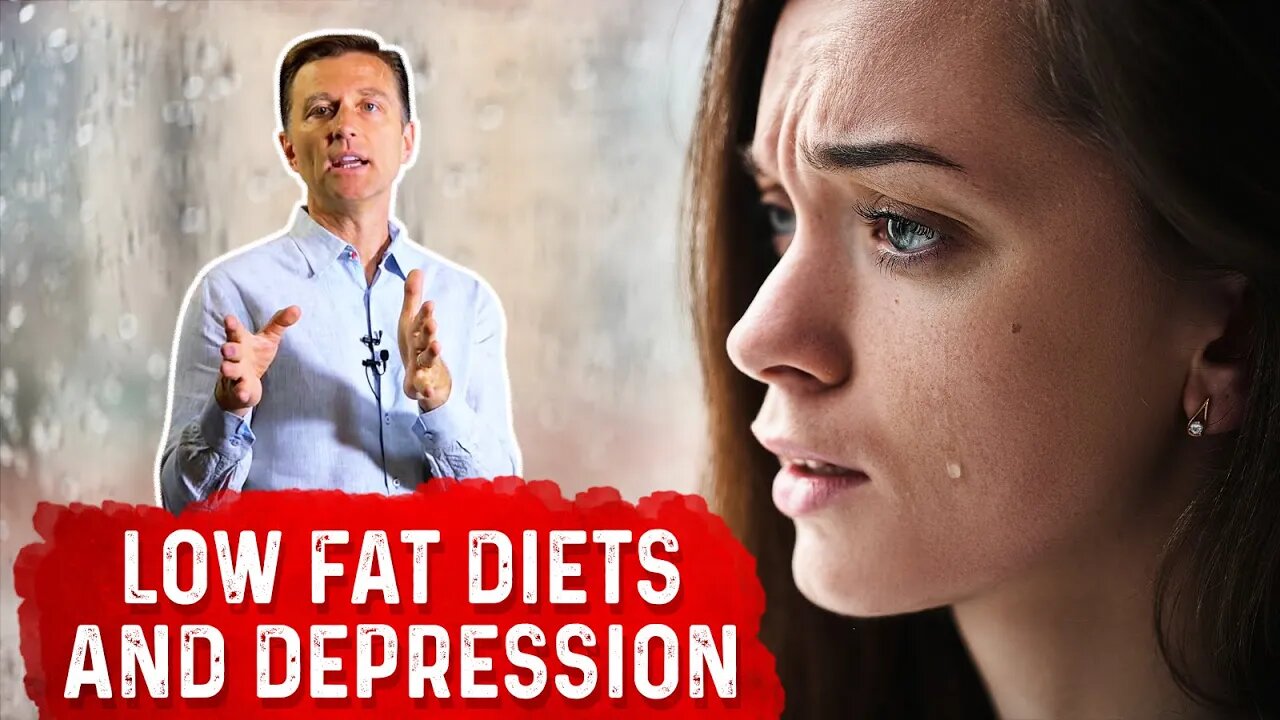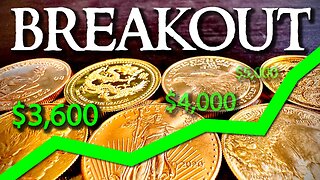Premium Only Content

Low Fat Diets & Depression (Mood Disorder) - Dr. Berg
Is a low-fat diet causing your depression? Find out in this video.
0:00 Introduction: Low fat diets and depression
0:28 Cholesterol and hormones
0:48 What causes low vitality?
0:58 Mood and diet connection
1:53 Foods high in cholesterol to add to your diet
2:14 Statin drugs and depression causes
In this video, I discuss the relationship between a low fat or low cholesterol diet and depression. Cholesterol is needed as a precursor, or building block, for critical hormones like estrogen, testosterone, and cortisol.
Women on their menstrual cycle, who just gave birth, or are in menopause can suffer from low estrogen, which can cause them to feel depressed.
If your testosterone is low, you can lose your vitality and lower your mood significantly.
If your cortisol is low due to a low-fat diet, you won’t be able to handle stress well. This can trigger anxiety and depression.
You need cholesterol to keep your serotonin levels high. Serotonin is imperative for overall well-being and mood. It is also important in the production of vitamin D. If you’re deficient in vitamin D, you can easily become depressed.
On a low-fat diet, you may lack essential fatty acids which support brain health. This also impairs your ability to properly absorb the fat-soluble vitamins A, E, and K that are necessary for hormones and brain health.
You can get cholesterol from animal foods, egg yolks, and butter. It is very hard to get enough cholesterol on a plant-based diet. If you’re vegetarian and feel depressed, get your cholesterol checked. If it’s below 160, that could be why you’re depressed.
Another depression cause is statin drugs. Statins are drugs that block the body’s production of cholesterol. A side effect of statins is depression.
If your gallbladder was removed or is sluggish, you may not have the available bile to make cholesterol available to build the hormones your body needs. Try taking purified bile salts to help support the gallbladder.
Dr. Eric Berg DC Bio:
Dr. Berg, age 57, is a chiropractor who specializes in Healthy Ketosis & Intermittent Fasting. He is the author of the best-selling book The Healthy Keto Plan, and is the Director of Dr. Berg Nutritionals. He no longer practices, but focuses on health education through social media.
Follow Me On Social Media:
Facebook: https://bit.ly/FB-DrBerg
Instagram: https://bit.ly/IG-DrBerg
Anchor: https://bit.ly/Anchor-DrBerg
TikTok: https://bit.ly/TikTok-DrBerg
Send a Message to his team: https://m.me/DrEricBerg
ABOUT DR. BERG: https://www.drberg.com/dr-eric-berg/bio
Disclaimer:
Dr. Eric Berg received his Doctor of Chiropractic degree from Palmer College of Chiropractic in 1988. His use of “doctor” or “Dr.” in relation to himself solely refers to that degree. Dr. Berg is a licensed chiropractor in Virginia, California, and Louisiana, but he no longer practices chiropractic in any state and does not see patients so he can focus on educating people as a full time activity, yet he maintains an active license. This video is for general informational purposes only. It should not be used to self-diagnose and it is not a substitute for a medical exam, cure, treatment, diagnosis, and prescription or recommendation. It does not create a doctor-patient relationship between Dr. Berg and you. You should not make any change in your health regimen or diet before first consulting a physician and obtaining a medical exam, diagnosis, and recommendation. Always seek the advice of a physician or other qualified health provider with any questions you may have regarding a medical condition.
#keto #ketodiet #weightloss #ketolifestyle
Thanks for watching. I hope this explains the connection between low-fat diets and depression. I'll see you in the next video.
-
 10:44
10:44
Dr. Eric Berg
20 days agoThis Ingredient Is KILLING Your Dog...
9.14K33 -
 1:39:50
1:39:50
The White House
5 hours agoPresident Trump Makes Announcements, Sep. 5, 2025
27.6K16 -
 LIVE
LIVE
Red Pill News
3 hours agoBombshell Biden Docs Invalidate Autopen Pardons on Red Pill News Live
3,205 watching -
 9:36
9:36
Silver Dragons
2 hours agoGold Price NEW ALL TIME HIGH - $5,000 GOLD NEXT?
12.5K2 -
 LIVE
LIVE
LFA TV
11 hours agoLFA TV ALL DAY STREAM - FRIDAY 9/5/25
890 watching -
 13:43
13:43
The Kevin Trudeau Show Limitless
2 days agoClassified File 3 | Kevin Trudeau EXPOSES Secret Society Brainwave Training
86.8K18 -
 1:11:24
1:11:24
vivafrei
6 hours agoDearborn Heights Police Have Been CONQUERED! Gender Madness on PASSPORTS! Canada Stuff & MORE!
90.7K46 -
 1:44:43
1:44:43
The Quartering
5 hours agoConservative Scam Busted, Black Fatigue Hits Airlines, Kimmel Meltdown
114K44 -
 39:07
39:07
Tudor Dixon
2 hours agoRFK Jr., Big Pharma, and the Hidden Risks of SSRIs in Pregnancy | The Tudor Dixon Podcast
7.2K -
![MAHA News [9.5] RFK Lights Up Congress, CDC House Cleaning, Fight Over Vax Mandates For School Children](https://1a-1791.com/video/fww1/b9/s8/1/i/h/m/f/ihmfz.0kob-small-MAHA-News-9.5.jpg) 1:35:42
1:35:42
Badlands Media
14 hours agoMAHA News [9.5] RFK Lights Up Congress, CDC House Cleaning, Fight Over Vax Mandates For School Children
23.8K3